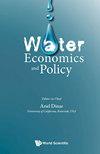Driving Forces of Water Intensity in China’s Industrial Sector: A Global Meta-Frontier Production–Theoretical Decomposition Analysis
IF 1.3
4区 经济学
Q3 ECONOMICS
引用次数: 2
Abstract
The shortage of water resources has prohibited the sustainable growth of China. Identifying the driving forces of water intensity is critical to initiating cost-effective policies and regulations to reduce water consumption across China. We develop a global meta-frontier production decomposition approach, which could simultaneously address the spatial and temporal heterogeneities, to decompose the water intensity of the industrial sector in China at various levels from 2011 to 2015. Results show that the industrial water intensity in all provinces except Shanxi has been declining over the sample period, with little potential for a further reduction. Second, at the national level, the potential water usage factor and the temporal catch-up effect of water usage technology are two significant contributors in reducing the industrial water intensity. Third, we find that some factors have mixed results at the regional and provincial levels, calling for customized policies in these aspects. Our approach provides a more precise decomposition and reveals more details in China’s variations of industrial water intensity, which has manifold implications for regional water management.中国工业部门用水强度驱动力:全球元前沿生产-理论分解分析
水资源短缺阻碍了中国的可持续发展。确定水强度的驱动因素对于启动具有成本效益的政策和法规以减少中国的水消耗至关重要。本文提出了一种同时解决时空异质性的全球元前沿生产分解方法,对2011 - 2015年中国工业部门不同层次的水强度进行了分解。结果表明:除山西外,其余省份的工业用水强度在样本期内呈下降趋势,且进一步下降的潜力不大;第二,在国家层面上,潜在用水因子和用水技术的时间追赶效应是降低工业用水强度的两个重要因素。第三,我们发现一些因素在区域和省级层面的效果好坏参半,需要在这些方面制定个性化的政策。我们的方法提供了更精确的分解,并揭示了中国工业用水强度变化的更多细节,这对区域水管理具有多方面的影响。
本文章由计算机程序翻译,如有差异,请以英文原文为准。
求助全文
约1分钟内获得全文
求助全文

 求助内容:
求助内容: 应助结果提醒方式:
应助结果提醒方式:


